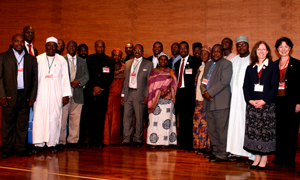CTG co-organizes 1st International Conference on Theory and Practice of Electronic Governance
 Sharon Dawes and Theresa Pardo (far right) with Dr. Olu Agunloye (sixth from right, front row), who gave the practitioner keynote presenting the strategies behind e-governance in Nigeria, along with the rest of the Nigerian delegation.
Sharon Dawes and Theresa Pardo (far right) with Dr. Olu Agunloye (sixth from right, front row), who gave the practitioner keynote presenting the strategies behind e-governance in Nigeria, along with the rest of the Nigerian delegation.
CTG was recently a co-organizer of the 1st International Conference on Theory and Practice of Electronic Governance (ICEGOV 2007) in Macao SAR, China. This partnership with the United Nations University International Institute for Software Technology (UNU-IIST) and the UN Asian and Pacific Training Centre for Information and Communication Technology (APCICT), attracted practitioners, developers, and researchers from government, academia, industry, and non-governmental communities worldwide. Participants came together to share the latest findings in the theory and practice of Electronic Governance and to discuss their specific experiences and concerns.
ICEGOV 2007 engaged participants from both developing and developed countries in an exchange of experiences and views across cultural boundaries. Conference delegates and papers submitted represented over 50 countries from Asia, Africa, Europe, and North America. Topics of discussion included interoperability, knowledge management, organizational transformation, policy development, education and capacity building, innovation, socio-economic development, citizen e-participation, and rural issues.
“Many of the challenges of Electronic Governance present either new problems or new contexts for action. While these offer opportunities to advance democracy, accountability and service, they also present risks for all stakeholders,” said Sharon Dawes, CTG senior fellow and general co-chair of ICEGOV 2007. “We need to learn to treat this domain as a knowledge-sharing enterprise, where experience and research complement one another to create well-informed policies, strategies and tools.”
In addition to serving as general co-chair, Sharon also gave one of three invited talks on Advancing E-governance: Connecting Learning and Action. Her talk focused on ways to conceptualize, operationalize, and capitalize on ways to link research and practice in a shared and mutually rewarding enterprise aimed at better public management and better governance. Dr. Olu Agunloye, National eGovernment Strategies (NeGSt), gave the practitioner keynote presenting the strategies behind e-governance in Nigeria. The third invited talk, reviewing the UN Global E-government Readiness Report, was presented by Elia Yi Armstrong of the UN Department of Economic and Social Affairs (UNDESA).
Theresa Pardo, CTG deputy director, served as program co-chair for ICEGOV2007, and in addition to overseeing the overall program, was co-coordinator of a tutorial and workshop on organization and management with Yuanfu Jiang from the National School of Administration, P.R. China. Their tutorial and workshop contributed to understanding the role of information and information technology issues in the transformation of public agencies in both the US and China, and examined the fundamentals of organizational transformation in the public sector, and in particular the role of ICTs in that transformation process. Their jointly authored paper on this topic is published in the conference proceedings.
In addition, Lei Zheng, CTG graduate assistant and Ph.D. student at Rockefeller College of Public Affairs and Policy, presented his paper, Enacting and implementing open government information regulations in China: motivations and barriers. This paper examines the political, economic and administrative motivations for the enactment of the regulation, and then explores the potential legal, institutional, administrative, social and economic barriers for the implementation of the regulation.
During the four days of ICEGOV 2007, government representatives described their Electronic Governance initiatives and discussed lessons learned and the remaining challenges. Industry and non-governmental participants proposed and demonstrated potential technological, organizational and societal solutions, and members of the academic community presented new models, theories, and frameworks that can extend the understanding of Electronic Governance and serve as the foundation for building new tools and methods.
ICEGOV 2007 was organized in cooperation with the Center for Electronic Governance, United Nations University International Institute for Software Technology and the Asian and Pacific Training Centre for Information and Communication Technology for Development, United Nations Economic and Social Commission for Asia and the Pacific. (For information about the organizers, see http://www.icegov.org/icegov/people/organizers/). The Macao Polytechnic Institute, Macao Foundation, Macao Government Education and Youth Affairs Bureau, Macao Government Tourism Office, Macao Post, and eGov Magazine were sponsors of the conference.